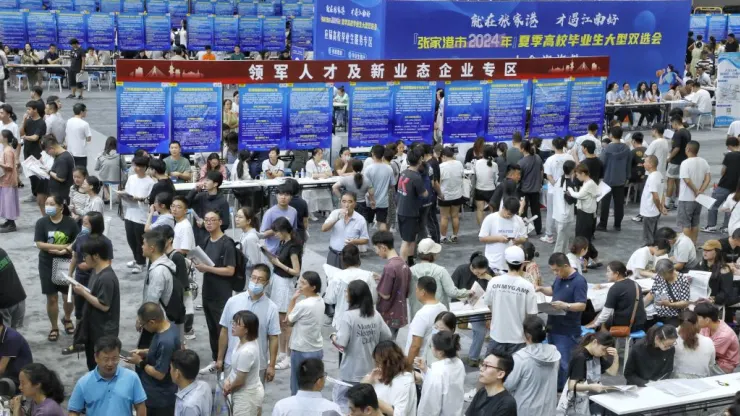China’s youth unemployment rate has reached an alarming 17.1% in July, marking the highest level since the country introduced a new unemployment tracking system in December. This sharp rise underscores a growing crisis among young people in the world’s second-largest economy and raises significant concerns for China’s long-term economic stability and social cohesion.

The Rising Tide of Unemployment
The youth unemployment rate has been steadily increasing over the past few months, reflecting the broader challenges facing the Chinese economy. The 17.1% figure is particularly worrying, given that it represents a significant jump from the previous month’s 16.8% and continues a troubling trend that began earlier this year. This rise in unemployment among China’s youth highlights the difficulties many young people are facing in securing stable employment in an increasingly competitive job market.
The situation is exacerbated by a combination of factors, including slowing economic growth, a shrinking job market, and the lingering effects of the COVID-19 pandemic. As China grapples with these challenges, the youth, who represent the future of the nation, are finding it increasingly difficult to secure jobs that match their qualifications and aspirations.
Economic Implications of Youth Unemployment
Youth unemployment in China is not just a social issue; it has far-reaching economic implications. High levels of unemployment among young people can lead to reduced consumer spending, as those without jobs are less likely to spend money on goods and services. This, in turn, can slow down economic growth, creating a vicious cycle that is difficult to break.
Moreover, prolonged unemployment can have long-term effects on the career prospects of young people. Without early job opportunities, many may find it challenging to build the skills and experience needed to advance in their careers. This could result in a generation of underemployed workers, leading to a loss of potential productivity and innovation in the economy.
The Role of the Education System
China’s education system has been criticized for its role in the youth unemployment crisis. The system, which is heavily focused on academic achievement, may not be adequately preparing students for the realities of the job market. Many young graduates find themselves without the practical skills needed to succeed in the workforce, leading to a mismatch between the supply of labor and the demand for specific skills.
This skills gap is particularly evident in sectors that are crucial for China’s future growth, such as technology and engineering. Despite the government’s push to promote these fields, many young people are struggling to find employment in these areas, leading to frustration and disillusionment.
Government Response to the Crisis
The Chinese government has acknowledged the severity of the youth unemployment problem and has taken steps to address it. In recent months, the government has rolled out various initiatives aimed at boosting employment, including offering subsidies to companies that hire young workers and providing training programs to help young people acquire new skills.
However, critics argue that these measures may not be enough to tackle the root causes of the unemployment crisis. Some experts believe that more comprehensive reforms are needed, such as overhauling the education system to better align it with the needs of the job market and implementing policies that encourage entrepreneurship and innovation among young people.
The Human Cost of Unemployment
Beyond the economic implications, the rise in youth unemployment is having a profound impact on the mental health and well-being of young people in China. The stress and anxiety associated with prolonged joblessness can lead to a range of mental health issues, including depression and anxiety. This, in turn, can have a ripple effect on families and communities, as young people struggle to cope with the pressures of an uncertain future.
The social implications of high youth unemployment are also significant. As more young people remain unemployed, there is a risk of increased social unrest and disillusionment with the government. This could lead to greater political instability, particularly if young people feel that their concerns are not being adequately addressed by the authorities.
The Way Forward
Addressing China’s youth unemployment crisis will require a multifaceted approach that tackles both the immediate and long-term challenges facing young people. This includes creating more job opportunities, reforming the education system, and providing greater support for mental health and well-being.
The government must also work to foster an environment that encourages innovation and entrepreneurship among young people. By providing the necessary resources and support, the government can help young people to create their own opportunities and contribute to the economy in meaningful ways.
As China continues to navigate its economic challenges, the issue of youth unemployment will remain a critical concern. The future of the nation’s economy depends on the ability of its young people to find stable, fulfilling employment and to contribute to the country’s growth and development.
For more in-depth analysis on global economic trends, visit our dedicated section at Digital Digest.




